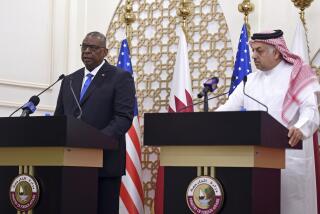Iran Hindering Terrorism War, CIA Chief Says
- Share via
WASHINGTON — Interference from Iran is emerging as one of the most vexing problems for allied interests in Afghanistan because the Islamic Republic continues to allow Al Qaeda and Taliban fighters to escape across its border, the director of the CIA told members of Congress on Tuesday.
Characterizing Iran’s behavior as “worse than schizoid,” CIA Director George J. Tenet said that Tehran’s initial signs of cooperation with the United States in the war in Afghanistan “are being eclipsed by Iranian efforts to undermine U.S. influence there.”
In testimony before the Senate Armed Services Committee, Tenet signaled that the United States could face a number of dangerous battles and operations in Afghanistan before the terrorist threat there is contained.
Tenet said allied forces have been frustrated by their inability to prevent the enemy from escaping, and he noted that intelligence agencies have identified additional “pockets of Al Qaeda and Taliban” fighters hiding in eastern provinces that border Pakistan.
He also said the United States remains vulnerable to attack by members of the Al Qaeda network, even though the war on terrorism has led to more than 1,300 arrests in 70 countries.
“Al Qaeda leaders still at large are working to reconstitute the organization,” Tenet said. “As spring emerges, we’ll see, maybe, more activity on their part.”
In only his second public appearance before Congress since the Sept. 11 terrorist attacks, Tenet discussed a wide range of challenges, from the proliferation of chemical and biological weapons to what he said was a shrinking advantage that the United States holds in satellite technology.
But he spent the bulk of the session providing a progress report on the war against terrorism.
The U.S.-led operation in Afghanistan “has dealt severe blows to Al Qaeda and its leadership,” he said. “The group is no longer able to run large-scale training and recruitment programs in Afghanistan.”
But he offered no new information on the whereabouts of Osama bin Laden and other Al Qaeda leaders.
Several committee members pressed Tenet for details on Iraq. The White House has made it clear that it aims to topple President Saddam Hussein’s regime, even though Vice President Dick Cheney is encountering substantial resistance to such plans during his current tour of the Middle East.
Tenet declined to assess either the strength of groups within Iraq that could serve as proxy forces for the U.S. military or the potential successors to Hussein, saying he would discuss the matter later in a closed-door session.
Baghdad continues to pursue nuclear weapons and other weapons of mass destruction, Tenet said. Asked whether any evidence ties Iraq to the Sept. 11 attacks, Tenet said that there have been contacts between Hussein’s government and Al Qaeda but that “the jury’s out” on any more direct link to the assault on the Pentagon and the World Trade Center.
Tenet offered a particularly pessimistic assessment of Iran, saying that momentum for reform within the country appears to have ebbed and that there is little sign that Tehran has reduced its support for terrorist activities in the last year.
In recent weeks, there have been reports that Iranian military and intelligence operatives have entered Afghanistan and are working to destabilize the government of interim Prime Minister Hamid Karzai. Tenet acknowledged that such activities are a major concern but declined to discuss the matter in public session.
He did single out Iran for being particularly uncooperative in sealing its eastern border, saying that Tehran “has failed to move decisively against Al Qaeda members” crossing into its territory.
The Al Qaeda network is headed by members of the Sunni branch of Islam who have traditionally been at odds with the Shiite regime in Iran. But Tenet said the United States can no longer count on such religious divisions in ruling out collaboration on terrorism.
“There is a convergence of common interest in hurting the United States and its allies,” he said.
The porous border with Iran is part of a broader problem that allies have faced in sealing off enemy escape routes. “We’re frustrated that people did get away,” Tenet said. “We have worked pretty hard on it, but there’s still many, many points of exit that people in small numbers can get out.”
More to Read
Sign up for Essential California
The most important California stories and recommendations in your inbox every morning.
You may occasionally receive promotional content from the Los Angeles Times.










